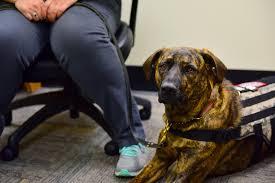Thanks to the ADA – Hank’s Story
Service animals help people with disabilities live independent lives by assisting them with everyday tasks. Service animals can be trained to help with many different tasks including alerting a person to a seizure or helping to prevent a panic attack. The ADA ensures that service animals, defined as dogs (and miniature horses in some instances), can go wherever the general public can go, including into medical facilities.
Hank* is a veteran with a trained service dog. When Hank tried to make a medical appointment, the provider thought that he had to show his dog’s “papers” before accessing its facilities. Hank was concerned he wouldn’t be able to access his necessary medical appointments, so he reached out to DRT for help.
Under the ADA, a business (or medical provider) cannot request the paperwork of a service dog. Instead, a business may ask the service animal user two questions:
1) Is the dog needed because of a disability?
2) What task has the dog been trained to perform?
DRT helped the medical provider understand Hank’s rights. And Hank was happy to answer the questions allowed by the ADA. Thanks to the ADA, Hank was able to access the medical care he needed while accompanied by his service dog.
*Not his real name

